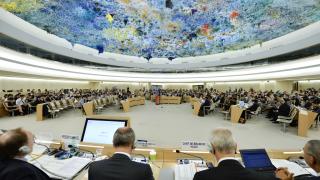
The UN Human Rights Council (HRC) recently concluded its 29th session in Geneva with the adoption of 25 resolutions and one presidential statement. These resolutions reflect a variety of topics, though the total number adopted had decreased compared to the previous 28th session. In his opening statement to the Council, the High Commissioner for Human Rights Zeid Ra’ad Al Hussein expressed concern about violations of human rights in Libya, the Occupied Palestinian Territories, Ukraine and Nigeria. He also spoke about the UK’s proposal to repeal the Human Rights Act, expressing the following:
“I am worried by the impact of this initiative both in the UK and in other countries, including many where the UK is working to promote and protect human rights. As a long-standing democracy, the UK should set an example at home by ensuring that human rights protection, once brought in, is not subsequently weakened.”
During the session six new Special Procedures mandate-holders were appointed and four panel discussions were held, including one on terrorism and human rights. See below for further highlights from the session.
Country-specific issues
South Sudan
In a resolution the Council called upon the Government of South Sudan to investigate and report on violations of human rights and hold to account those responsible. Deeply concerned about the human rights situation since 2013, it urged the Government to prevent atrocities and called on the Sudan People’s Liberation Movement/Army to end abuses against children.
Myanmar
In response to the human rights situation of Rohingya Muslims and other minorities in Myanmar, the HRC adopted a resolution calling on the Myanmar Government to protect the human rights of all people. The HRC also encouraged the Government to take the necessary measures to end the ongoing discrimination and prejudice against Muslims and other minorities.
Syria
Echoing concerns of the High Commissioner on the ongoing conflict in Syria, the Council strongly condemned the systematic and widespread violations of human rights abuses. Adopted with 29 states in favour, there was also condemnation against acts of terror and violence against civilians carried out by extremist groups such as Islamic State in Iraq and the Levant.
Thematic issues
Human rights of migrants
The HRC held its first enhanced interactive dialogue on the human rights of migrants. This new format of interactive dialogue allows the Council to respond more effectively to specific human rights matters. In addition, civil society organisations were also able to participate alongside states and Special Rapporteurs. This session explored concerns about the causes of migration, the impact of humanitarian crises and the need to ensure that the human rights of migrants are upheld wherever they are in the world.
Rights of women and girls
Three panel discussions about women and girls’ rights were held during this session. The first discussion focused on obstacles that prevented girls from enjoying full rights to education, such as gender stereotypes, harmful traditional practices such as female genital mutilation and child marriage. The two other panels looked at preventing domestic violence against women and the equal participation of women in positions of power.
Climate change
The Council adopted a resolution on climate change expressing concern over the adverse effect it can have on the fulfilment of human rights. The resolution asked the Office of the High Commissioner for Human Rights to conduct a study on the relationship between climate change and the enjoyment of physical and mental health rights. The Council requested that the study be submitted before the 31st Council session.
Photo: A general view of participants during the 29th Regular Session of the Human Rights Council.Copyright: UN Photo






